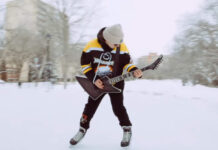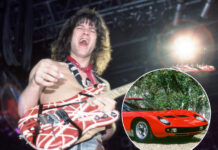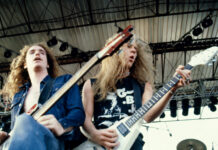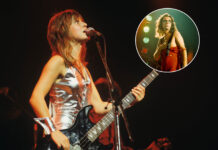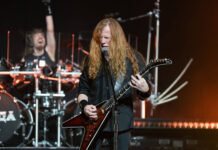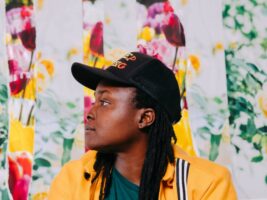
Get to know the Martin Showcase class of 2024: Joy Oladokun
Ad feature with Martin
Joy Oladokun is part of Martin’s Showcase class of 2024: find out more about the Showcase programme at martinguitar.com, and in this year’s Martin Journal.
Like all the best singer-songwriters, Joy Oladokun’s music is completely relatable but still clearly drawn from her own experiences. Having been inspired to pick up the guitar by a video of Tracy Chapman doing a solo acoustic performance to a captivated Wembley crowd, it’s perhaps unsurprising that Joy’s music retains a healthy appreciation for the emotional heft that can live in a simple song.
With album titles like In Defence Of My Open Happiness and Proof Of Life, Joy’s music often explores a bittersweet yet ultimately hopeful view on things. Her songwriting is often inspired by her identity as Black and openly queer, and often asks questions about finding her own version of spirituality. Oladokun was for a while a worship leader in an evangelical church – songs like Sunday explore the homophobia Joy witnessed in that environment.
Across her four studio albums, Joy has developed her sound into a lushly-produced, layered take on indie-folk. But whether it’s electric or acoustic guitar flourishes taking centre-stage, there’s a consistently organic feel to the sound. Joy’s NPR Tiny Desk From Home concert, filmed in her hometown of Nashville, is a great showcase of this, and thanks to some immaculate engineering sounds almost indistinguishable from her recorded output, in the best way possible.
Her latest full-length – 2023’s Proof Of Life also features collaborations with Mt. Joy, Chris Stapleton, Manchester Orchestra, Noah Kahn and Maxo Kream. Since its release she has also dropped the single Questions, Chaos and Faith.
What drew you to playing music, playing guitar?
I started playing the guitar because there’s a video of Tracy Chapman playing Fast Car, solo, acoustic, in front of Wembley. And my dad showed it to me when I was a kid – that was the first time I had seen someone that looked like me play the guitar. It just opened up the “I want to do that” road.
Who else were you learning when you started out?
I grew up around the pop-punk of the early 2000s, so I was listening to Fall Out Boy, Death Cab For Cutie, TV On The Radio, that type of stuff. But I was also listening to Bob Marley, Toots and the Maytals, Jimi Hendrix and King Sunny Adé. So an interesting mix of grocery-store rock and more soulful, psychedelic sounds.
How did that translate into doing music as a day job?
I was in a band in high-school, obviously – you have to go through that phase. But I was honestly doing a lot of other things – I was working in churches, in ministry – but that didn’t work out because of my queerness and a lot of other stuff. After that I got a job playing guitar and singing backing vocals for an artist in LA. That was my first inroad to being a musician as a day job. I could find work, and it could sustain me, and I wasn’t really planning on being an artist.
But when I started songwriting for other artists, the feedback I got all the time was “this is so specific, this person’s voice is so unique that we can’t really imagine anyone else on it.” So I started releasing music as a way to convince other people to release music that I had written!
Is songwriting what drew you to Nashville?
Yeah – I feel like you end up in Nashville at some point if you’re a songwriter in the US. And it was exactly that for me. I got invited on a trip here, and I just loved it. I loved the culture, the music, it reminded me of the music I was discovering as I grew up. So I just moved, because, why not do that all the time? I grew up in a very small town. In Los Angeles, I felt like a fish out of water. It’s nice to be in a bit of a smaller city.
What’s one of your favourite things that you’ve written?
I guess Somebody Like Me is on that list, just because I wanted to write something that anybody could sing. But I guess that takes on different layers, depending on who it’s coming from, you know – on the surface it’s this pretty simple shitty pop song but then you go okay, it’s written by a black queer person, sort of challenging god and religious people, saying, like, ‘hey, like could you extend that kindness to me’ – but someone on the other side of the spectrum that I live on could also sing that and also relate to it.
If there is one thing that drives why I make my art, it’s to bridge the gaps in our humanity. To say, even if you think I’m totally different from you, I feel some of the things that you feel too. It’s about finding ways to put my story and experience across, in a way that lets people find themselves in it.
How has working in your own home studio informed your approach to production?
I’m trying to create the music that I think my heroes would have made if they had access to the tools that I have. If Jimi Hendrix had a drum machine, what would he do with it? I’m in my home studio now, and there’s mics and technology everywhere – that’s one of the biggest inspirations for me: I have all these things that the people who came before me could never imagine having. How can I use that to make something meaningful? That, and I could press upload tonight and something could be out in the world tomorrow. I want to use that urgency to my advantage.
Are you still working on things at the moment?
I like to joke that I’m like the Drake of folk music – rather than taking a few years to figure out what the next project is, I feel like my heart and my brain are always finding things to write about and to be inspired by. So It’s cool that it’s my job, but it almost feels therapeutic in that sense – there’s an interesting balance there. On the surface it maybe appears as a grind, but it’s more like, “I had a weird year last year. Let me get into the studio and process it. And the way things work today, I could have an album done by summer. The immediacy with which I can create things and put them out is really crazy.
What role does the guitar play in that?
You can pick up an acoustic and it’s all these things, you know, warm, rich, you can play Wonderwall on it. But also, what happens if you plug that acoustic in and then lean it against the amp? An entirely new tone comes out. It can be this very expressive thing, and there’s this simplicity to it, but you can also find ways to change the character of it entirely.
But in terms of writing – I don’t like to put something out unless I feel like I can play it with a guitar by myself. I think there is something to that. I mean, we saw it at the Grammys, when Tracy Chapman performed. There was this visceral response to just two people playing and singing. And I think remembering that is where the intimacy comes from in my songwriting. I guess I really do strive for this feeling of, you know – some goofball in a coffee shop.
You’ve just recently started working with Martin – what’s your history with their guitars?
I actually got my first Martin not too long ago. I got it in Austin, Texas, and it used to be owned by an old worship leader, funny, as that’s what I used to do. So I’ve, like, defaced it with duct tape – now it says “Smoke Weed Not Bombs” on it. But I’m really stoked about it, some of my favourite people play Martins. And you know, the acoustic guitar was my first instrument, so to continue this journey of growing as a guitar player is really exciting
About Martin’s Spotlight programme
Artists are the lifeblood of Martin Guitar. From Johnny Cash to Joan Baez, countless influential musicians helped make Martin what it is today. Now, Martin has set its sights on the next generation of musicians with the new Artist Showcase. The program aims to celebrate artists who are making waves in the industry, and serves as a platform to connect the artists with Martin’s global audience.
Six artists are kicking off the Spotlight for 2024. They are Drayton Farley, Devon Gilfillian, Ian Munsick, Joy Oldakun, Nate Smith and Hailey Whitters, and together they represent the wide span of music being made on Martin guitars: from soulful vintage R&B to eclectically-influenced pop, and from uplifting country rock to raw, unflinching Americana. In this series of interviews, Guitar.com sits down with the six artists that make up the class of 2024.
The post Get to know the Martin Showcase class of 2024: Joy Oladokun appeared first on Guitar.com | All Things Guitar.
Source: www.guitar-bass.net



